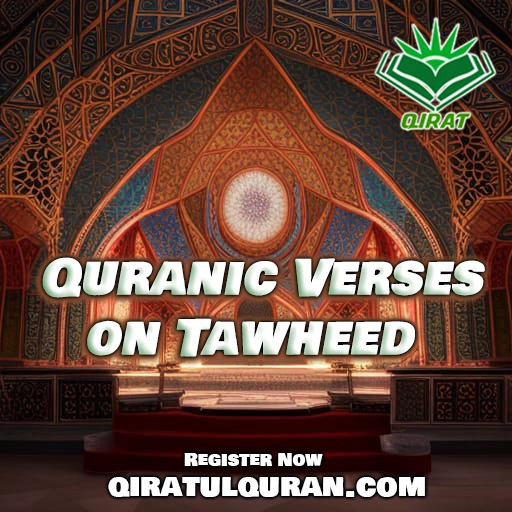Tawheed is the central concept in Islam which refers to the oneness and unity of God. Qiratul Quran will guide you The Quran lays great emphasis on this core tenet of faith. Here are some key Quranic verses about Tawheed and Islamic monotheism:

The Oneness and Uniqueness of Allah
Several verses in the Quran speak about how Allah is one and unique.
Allah is the Only True God Worthy of Worship
وَإِلَـٰهُكُمْ إِلَـٰهٌۭ وَٰحِدٌۭ ۖ لَّآ إِلَـٰهَ إِلَّا هُوَ ٱلرَّحْمَـٰنُ ٱلرَّحِيمُ
“And your god is one God. There is no deity [worthy of worship] except Him, the Entirely Merciful, the Especially Merciful.” (Quran, 2:163)
This verse highlights that Allah alone deserves worship. The use of the definite article ‘the’ before ‘Entirely Merciful’ and ‘Especially Merciful’ indicates Allah’s absolute unity.
Nothing is Comparable to Allah
قُلْ هُوَ ٱللَّهُ أَحَدٌ ١ ٱللَّهُ ٱلصَّمَدُ ٢ لَمْ يَلِدْ وَلَمْ يُولَدْ ٣ وَلَمْ يَكُن لَّهُۥ كُفُوًا أَحَدٌۢ
“Say, ‘He is Allah, [who is] One, Allah, the Eternal Refuge. He neither begets nor is born, Nor is there to Him any equivalent.'” (Quran, 112: 1-4)
This verse stresses Allah’s incomparability. He is the one and only, self-subsisting and self-sustaining God with no beginning or end.
Allah is the Only Creator and Provider
ٱللَّهُ خَـٰلِقُ كُلِّ شَىْءٍۢ ۖ وَهُوَ عَلَىٰ كُلِّ شَىْءٍۢ وَكِيلٌۭ
“Allah is the Creator of all things, and He is the Disposer of affairs over all things.” (Quran, 39:62)
This verse testifies that Allah is the sole creator and sustainer of the universe and everything in it.
Attributes of Allah’s Oneness
The Quran also describes the attributes that establish Allah’s absolute oneness.
Allah is Ever-Living and Eternal
هُوَ ٱلْأَوَّلُ وَٱلْـَٔاخِرُ وَٱلظَّـٰهِرُ وَٱلْبَاطِنُ ۖ وَهُوَ بِكُلِّ شَىْءٍ عَلِيمٌ
“He is the First and the Last, the Ascendant and the Intimate, and He has full knowledge of all things.” (Quran, 57:3)
This verse highlights that Allah is eternal, knowing no beginning or end. He was before all things and will remain after all things perish.
Allah does not beget nor is He begotten
لَمْ يَلِدْ وَلَمْ يُولَدْ
“He neither begets nor is born.” (Quran, 112:3)
Begetting children is an attribute of created beings. This verse makes clear that Allah does not have such limitations on mortal creations.
There is nothing like unto Him
لَيْسَ كَمِثْلِهِۦ شَىْءٌۭ ۖ وَهُوَ ٱلسَّمِيعُ ٱلْبَصِيرُ
“There is nothing like unto Him, and He is the Hearing, the Seeing.” (Quran, 42:11)
This verse establishes that no created being can be comparable to Allah. He is above all creation, absolutely unique.
Allah’s Oneness in His Lordship
The verses also affirm that Allah alone is the Lord and Sovereign of the universe.
Allah is the Only Sustainer and Administrator of All Affairs
تَبَـٰرَكَ ٱلَّذِى بِيَدِهِ ٱلْمُلْكُ وَهُوَ عَلَىٰ كُلِّ شَىْءٍۢ قَدِيرٌ
“Blessed is He in whose hand is dominion, and He is over all things competent.” (Quran, 67:1)
This verse highlights that Allah alone has control over all affairs and provides for all of creation. No one shares in His dominion.
Only Allah Deserves Supplication
وَإِذَا مَسَّ ٱلْإِنسَـٰنَ ضُرٌّۭ دَعَا رَبَّهُۥ مُنِيبًا إِلَيْهِ ثُمَّ إِذَا خَوَّلَهُۥ نِعْمَةًۭ مِّنْهُ نَسِىَ مَا كَانَ يَدْعُوٓا۟ إِلَيْهِ مِن قَبْلُ وَجَعَلَ لِلَّهِ أَندَادًۭا لِّيُضِلَّ عَن سَبِيلِهِۦ ۚ قُلْ تَمَتَّعْ بِكُفْرِكَ قَلِيلًا ۖ إِنَّكَ مِنْ أَصْحَـٰبِ ٱلنَّارِ
“And when you are touched by affliction, they cry out to their Lord, turning to Him in repentance. Then when He lets them taste from Him mercy, behold, a party of them ascribe partners to their Lord.” (Quran, 39:8)
This verse makes clear that Allah alone should be invoked in tough times, not other deities or beings. Supplicating anyone besides Allah equates to idolatry.
Gratitude is Owed to Allah Alone for His Blessings
وَمَا بِكُم مِّن نِّعْمَةٍۢ فَمِنَ ٱللَّهِ ۖ ثُمَّ إِذَا مَسَّكُمُ ٱلضُّرُّ فَإِلَيْهِ تَجْـَٔرُونَ
“And whatever you have of favor – it is from Allah.” (Quran, 16:53)
This verse establishes that as the sole sustainer, all blessings come from Allah alone, so gratitude should be directed to Him exclusively.
Belief in Allah’s absolute oneness forms the cornerstone of faith in Islam. The verses above are just some examples of how the Quran articulates the concept of Tawheed and pure monotheism.
What are the 5 hadiths on Tawheed?
1- Abu Bakr reported:
The Messenger of Allah, peace and blessings be upon him, said, “Whoever says there is no god but Allah and denies whatever is worshipped besides Allah, his wealth and blood are sacred and his reckoning will be with Allah.” (Sahih Muslim 17)
This hadith emphasizes the declaration of Tawheed – there is no god but Allah – and the denunciation of false gods. This is the essence of Islamic monotheism.
2- Ibn Umar reported:
The Messenger of Allah, peace and blessings be upon him, said, “Whoever swears by other than Allah has committed idolatry.” (Sunan al-Tirmidhi 1535)
This hadith states that oaths should only be taken in the name of Allah. Swearing by anything else is an act of idolatry, contradicting Tawheed.
3- Abu Huraira reported:
The Messenger of Allah, peace and blessings be upon him, said, “Allah the Exalted said: I am the One, I am the One who does not stand in need of a partner. Whoever does an action in which he associates anyone else with Me, I will reject him and his idol.” (Sahih Muslim 2985)
This hadith quotes Allah directly prohibiting any partners being associated with Him. He rejects all forms of idolatry and polytheism.
4- Ibn Abbas reported:
The Messenger of Allah, peace and blessings be upon him, said, “Whoever dies while still invoking anything other than Allah as a partner will enter Hellfire.” (Sahih Muslim 92)
This hadith underscores that associating partners with Allah is a matter of grave consequence. Polytheism can lead one to Hellfire.
5- Mu’adh ibn Jabal reported:
The Messenger of Allah, peace and blessings be upon him, said, “O Mu’adh, do you know what is the right of Allah upon His servants and what is the right of the servants upon Allah?” I said, “Allah and His messenger know best.” He said, “The right of Allah upon the servants is that they worship Him and do not associate anything with Him. The right of the servants upon Allah is that He does not punish whoever does not associate anything with Him.” (Sahih Muslim 30)
This hadith explains that sincerely worshipping Allah alone by not associating any partners with Him fulfills the purpose of our creation. In return, Allah promises not to punish such believers in the Hereafter.
What are the 7 types of Tawheed?
-
Tawheed al-Rububiyyah (Oneness of Lordship)
This refers to Allah being One and Unique in creating, sustaining, giving life and death, and administering the affairs of the universe.
-
Tawheed al-Uluhiyyah (Oneness of Worship)
This refers to worship being exclusive to only Allah. Muslims do not invoke or supplicate to anyone or anything other than Allah.
-
Tawheed al-Asma was-Sifat (Oneness of Names and Attributes)
This refers to Allah’s names and attributes being exclusive to Him. Muslims affirm them while refraining from comparing them to creation.
-
Tawheed al-Ibadah (Oneness of Servitude)
This refers to Muslims worshipping Allah sincerely as His slaves, detached from other objectives. Slavery and servitude are only for Allah.
-
Tawheed al-Mulk wa al-Hukm (Oneness of Sovereignty and Judgment)
This refers to Allah alone being the supreme sovereign, law-giver, and judge of the universe to whom judgment belongs.
-
Tawheed al-Khuluq (Oneness of Following His Guidance)
This refers to following and obeying the way of life legislated by Allah and abstaining from Bid’ah (religious innovations).
-
Tawheed al-Ittiba (Oneness of Seeking His Aid)
This refers to seeking Allah alone for help while relying upon Him exclusively instead of others.
These seven aspects encompass the comprehensive nature of Islamic monotheism (Tawheed) as outlined in the Quran and Sunnah.
What are the 3 aspects of Tawheed?
-
Tawheed al-Rububiyyah (Oneness of Lordship)
This refers to the belief that Allah alone is the Creator, Sustainer, and Administrator of all the affairs in the universe. He governs everything according to His divine will and plan.
Some key Quranic verses:
“Allah is the Creator of all things, and He is, over all things, Disposer of affairs.” (Quran 39:62)
“Such is Allah, your Lord; there is no deity except Him, the Creator of all things, so worship Him.” (Quran 6:102)
-
Tawheed al-Uluhiyyah (Oneness of Worship)
This refers to the belief that Allah alone deserves worship, and no one and nothing else can be worshipped besides or along with Him.
Some key Quranic verses:
“And your god is one God. There is no deity [worthy of worship] except Him.” (Quran 2:163)
إِنَّنِىٓ أَنَا ٱللَّهُ لَآ إِلَـٰهَ إِلَّآ أَنَا۠ فَٱعْبُدْنِى وَأَقِمِ ٱلصَّلَوٰةَ لِذِكْرِىٓ
“Indeed, I am Allah. There is no deity except Me, so worship Me.” (Quran 20:14)
-
Tawheed al-Asma was-Sifat (Oneness of Names and Attributes)
This refers to affirming Allah’s names and attributes mentioned in the Quran and Sunnah while absolving Him of any imperfections.
Some key Quranic verses:
إِنَّهُۥ مِن سُلَيْمَـٰنَ وَإِنَّهُۥ بِسْمِ ٱللَّهِ ٱلرَّحْمَـٰنِ ٱلرَّحِيمِ
“The Most Merciful (Ar-Rahman) I have believed in Allah and His Messengers.” (Quran 27:30)
هُوَ ٱللَّهُ ٱلَّذِى لَآ إِلَـٰهَ إِلَّا هُوَ ۖ عَـٰلِمُ ٱلْغَيْبِ وَٱلشَّهَـٰدَةِ ۖ هُوَ ٱلرَّحْمَـٰنُ ٱلرَّحِيمُ
“He is Allah, other than whom there is no deity, Knower of the unseen and the witnessed.” (Quran 59:22)
These three fundamental aspects form the doctrine of monotheism in Islam. Affirmation of all three is required. Denial of any one aspect removes one from the fold of Islam.
Summary on Quranic Verses on Tawheed
Tawheed refers to the oneness and unity of Allah. He alone is the only true God who is eternal, uncreated, and self-sufficient. Nothing in creation is comparable to Him, as He is completely unique and transcendent. Allah alone is the Creator, Sustainer, and Controller of all affairs in the universe. Worship is due to Allah alone without any partners or intermediaries. Allah has perfect names and attributes befitting His Majesty. Following and obeying Allah’s guidance is essential to Tawheed. Seeking help from Allah alone demonstrates Tawheed. Associating any partners with Allah is polytheism and violates Tawheed. Belief in Tawheed is the cornerstone of faith in Islam that distinguishes Islam’s pure monotheism. In essence, Tawheed affirms Allah’s absolute oneness in His lordship, worship, names, attributes, and right to obedience, while rejecting all forms of polytheism.





